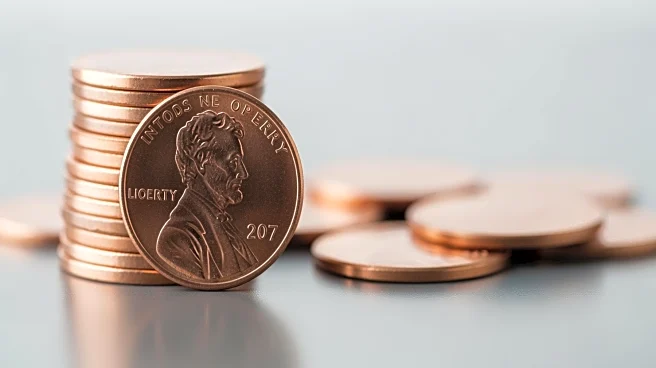What's Happening?
President Trump's executive order has halted the production of pennies, leading to significant disruptions in the retail sector. The U.S. Mint has ceased producing new pennies, and armored car services
have stopped delivering them, forcing businesses to adapt quickly to a cash system without the one-cent coin. Retailers, including fast-food chains and grocery stores, are implementing operational changes such as rounding transactions and posting notices about the unavailability of exact change. The sudden phase-out has caught many businesses off guard, leading to shortages and operational challenges. Some businesses, like Burger King franchisees, have resorted to stockpiling pennies to manage the transition, while others are facing customer dissatisfaction due to price rounding.
Why It's Important?
The penny phase-out is creating margin pressures for cash-focused businesses, particularly those with high volumes of small cash transactions. Retailers are experiencing a reduction in profit margins due to the need to round cash transactions to the nearest nickel. This rounding can either cut revenue directly or lead to customer dissatisfaction. Additionally, the cost of managing cash is rising, as businesses must hold and manage heavier coin inventories themselves. The phase-out is also accelerating the shift towards digital payments, which have lower handling costs and no rounding issues. However, businesses must navigate a potentially costly interim period with tighter margins on cash transactions.
What's Next?
The increased demand for nickels, which will replace pennies in many small cash transactions, could lead the U.S. Mint to significantly increase nickel production. Experts estimate that about 30-40% of the lost penny demand could shift to nickels, potentially leading to the production of between 2 billion and 2.5 billion nickels annually. The Trump administration's Department of Government Efficiency has also signaled that nickels could face elimination due to their high production costs. The U.S. Treasury is considering changing the metal composition of nickels to reduce costs rather than eliminating the coin outright.
Beyond the Headlines
The penny phase-out indirectly accelerates the push toward digital payments, which have lower handling costs and no rounding issues. While this shift may reduce cash-handling expenses in the long term, businesses must navigate a potentially costly and complicated interim period with tighter margins on cash transactions. The huge number of pennies in circulation means they will remain usable for years, drawing on Canada's experience where pennies persisted in retail and personal use even after official production stopped.









